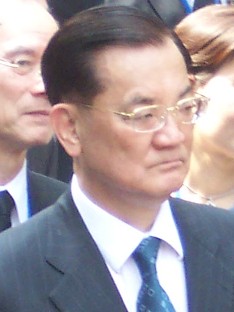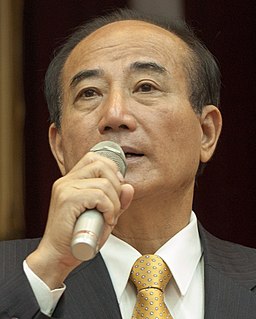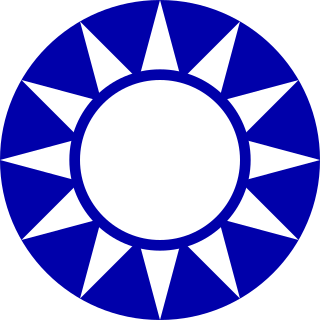
The People First Party is a center-right political party in Taiwan.

James Soong Chu-yu is a Taiwanese politician. He founded and chairs the People First Party, a smaller party in the Kuomintang (KMT)-led Pan-Blue Coalition.

Lien Chan is a politician in Taiwan. He was Premier of the Republic of China from 1993 to 1997, Vice President of the Republic of China from 1996 to 2000, and was the Chairman of the Kuomintang (KMT) from 2000 to 2005, apart from various ministerial posts he had also held. Upon his retirement as KMT Chairman in August 2005, he was given the title Honorary Chairman of the Kuomintang. He is highly credited after holding a groundbreaking visit to Mainland China in his capacity as the Chairman of the Kuomintang to meet with the General Secretary of the Communist Party of China Hu Jintao on 29 April 2005, the first meeting between the two party leaders after the end of Chinese Civil War in 1949, which subsequently helped thaw the long-stalled cross-strait relations.

The 10th President and Vice President election of the Republic of China was held on March 18, 2000, to elect the 10th-term President and Vice-President of the Republic of China under the 1947 Constitution. With a voter turnout of 82.69%, Chen Shui-bian and Annette Lu of the Democratic Progressive Party were elected president and vice president respectively with a slight plurality. This put an end to more than half a century of Kuomintang rule on Taiwan.

The 9th President and Vice President election of the Republic of China was the first direct presidential election in the history of the Republic of China. It occurred on 23 March 1996. In the previous eight elections the president and vice president had been chosen in a ballot of the deputies of the National Assembly, in accordance with the 1947 constitution.

Vincent C. Siew or Siew Wan-chang is a Taiwanese politician who served as the Vice President of the Republic of China from 2008 to 2012. He was the first Taiwanese-born Premier of the Republic of China and former vice-chairman of the Kuomintang (KMT).

Chen Li-an, sometimes spelled Chen Lu-an, is an electrical engineer, mathematician and former Taiwanese politician.

Wang Jin-pyng, is a Taiwanese politician. He served as President of the Legislative Yuan from 1999 to 2016, which makes him Taiwan's longest-serving legislative speaker. Once a leading figure of the Kuomintang (KMT), Wang is considered to be soft-spoken and a conciliatory figure who has often brokered deals between the KMT and opposition DPP. He was replaced by Democratic Progressive Party's Su Jia-chyuan as President of the Legislative Yuan after a decisive victory for the DPP in the 2016 election.

The 12th President and Vice President election of the Republic of China was held in Taiwan on Saturday, March 22, 2008. Kuomintang (KMT) nominee Ma Ying-jeou won with 58% of the vote, ending eight years of Democratic Progressive Party (DPP) rule. Along with the 2008 legislative election, Ma's landslide victory brought the Kuomintang back to power in Taiwan.

Local elections, commonly known as the "three-in-one elections", were held in Taiwan on December 3, 2005 for magistrates of counties, mayors of provincial cities, members of county and city councils, and heads of townships and county-administered cities. The elections were not held in the special municipalities of Taipei and Kaohsiung.

Wu Po-hsiung is a politician in Taiwan (ROC) who formerly served as chairman of the Kuomintang (KMT). He has been the Interior Minister (1984-1988), Mayor of Taipei (1988–1990), Secretary-General to the President (1991–1996), and Chairman of the KMT (2007-2009). Wu was nominated as Honorary Chairman of the Kuomintang when he was succeeded by Ma Ying-jeou as the Chairman of the Kuomintang.
The Kuomintang is a Chinese political party that ruled China 1927–48 and then moved to Taiwan. The name translates as "China's National People's Party" and was historically referred to as the Chinese Nationalists. The Party was initially founded on 25 August 1912, by Sun Yat-sen but dissolved in November 1913. It reformed on October 10th 1919, again led by Sun Yat-sen, and became the ruling party in China. After Sun's death, the party was dominated from 1927 to 1975 by Chiang Kai-shek. Though the KMT lost the civil war with the Communist Party of China in 1949, the party took control of Taiwan and remains a major political party of the Republic of China based in Taiwan.

The 9th Republic of China Legislative Yuan election was held on 16 January 2016 for all 113 seats to the Legislative Yuan in Taiwan. The Democratic Progressive Party (DPP) led by Tsai Ing-wen, who also won the presidential election on the same day, secured a majority for the first time in history by winning 68 seats. The ruling Kuomintang (KMT), lost both the presidency and the legislature, returned to the opposition.

Tuan Yi-kang is a Taiwanese politician. A former leader of the Democratic Progressive Party's now-abolished New Tide faction, he has served on the party's Central Standing Committee, the Taipei City Council and the Legislative Yuan.

Wellington Koo is a Taiwanese lawyer and politician. During his legal career, Koo represented several politicians. His own political career began with an unsuccessful campaign for the Taipei mayoralty in 2013. In 2016, he was elected a legislator at large representing the Democratic Progressive Party. Koo left the Legislative Yuan to lead the Ill-gotten Party Assets Settlement Committee. In 2017, he became chairman of the Financial Supervisory Commission.
Chang Sho-wen is a Taiwanese politician. He first won election to the Legislative Yuan in 2004 and was reelected in 2008. Partway through his second term, Chang was removed from office on charges of electoral fraud.

The 15th President and Vice President election of the Republic of China is scheduled to be held in Taiwan on 11 January 2020. Voters will either elect a new President and Vice President or re-elect the incumbents. The process of presidential primary elections and nominations are likely to be held during the last six months of 2019.
























